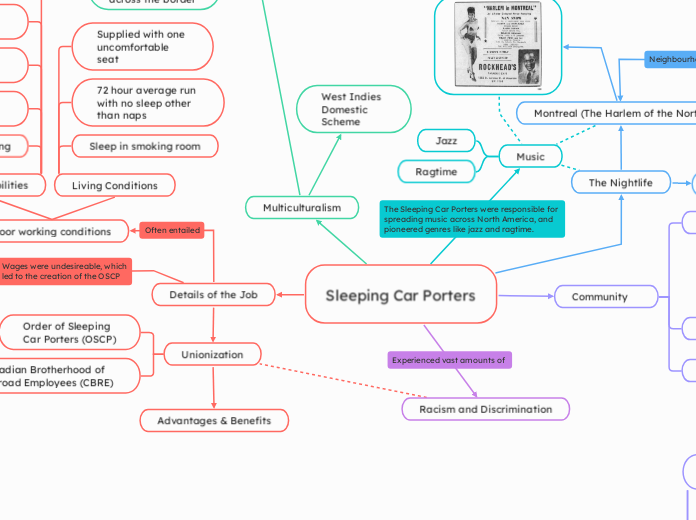Sleeping Car Porters
Details of the Job
Unionization
Order of Sleeping Car Porters (OSCP)
Canadian Brotherhood of Railroad Employees (CBRE)
Wages
Poor working conditions
Responsibilities
Greeting Passengers
& stowing baggage
Shining shoes & brushing off coats and hats
Looking after sick children and adults
Dealing with passengers who had had too much to drink
Policing
Living Conditions
Supplied with one
uncomfortable
seat
72 hour average run
with no sleep other
than naps
Sleep in smoking room
Racism and Discrimination
Community
Black Neighbourhoods
Trainyards
The Church
Entrepreneurial Pursuits
Side Hustles
Smuggling goods on
and off the train.
Smuggling onto
and off of train
Barbershops
The Nightlife
Montreal (The Harlem of the North)
Little Burgundy
"Wet city", Lack of Prohibition
Music
Jazz
Ragtime
Multiculturalism
Porters wanted to
get their families into Canada
across the border
West Indies Domestic Scheme
It was their home on the road. It was reliable connection to their community back at home, and a way to stay connected between communities and cities.
The Order of Sleeping Car Porters
(OSCP) was the first Black labour union in North America. It was formed because black workers wanted to improve their working conditions, but were not allowed to join white unions such as the Canadian Brotherhood of Railroad Employees (CBRE).
Sleeping car porters were often treated
as less than humans.
"[W]e were babysitters, not only for little kids but for adults."
- Herb Carvery, sleeping car porter
